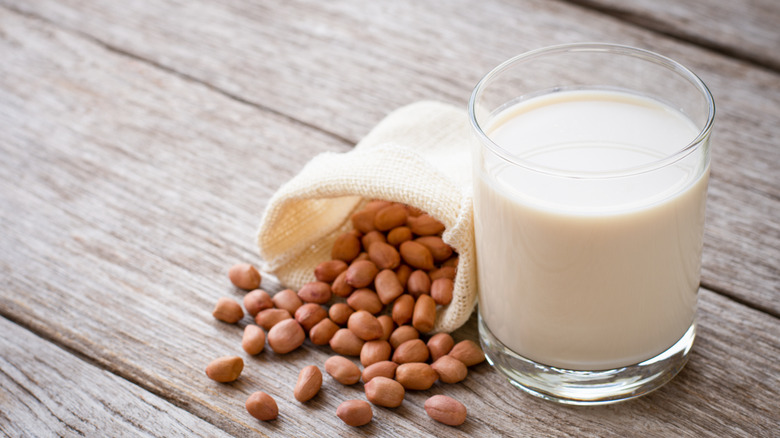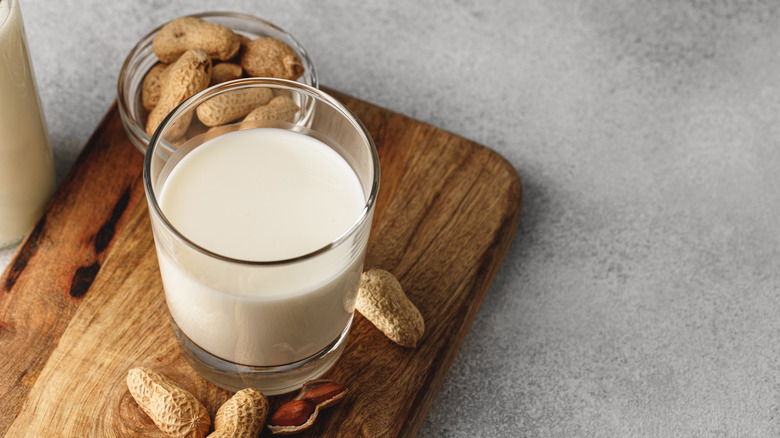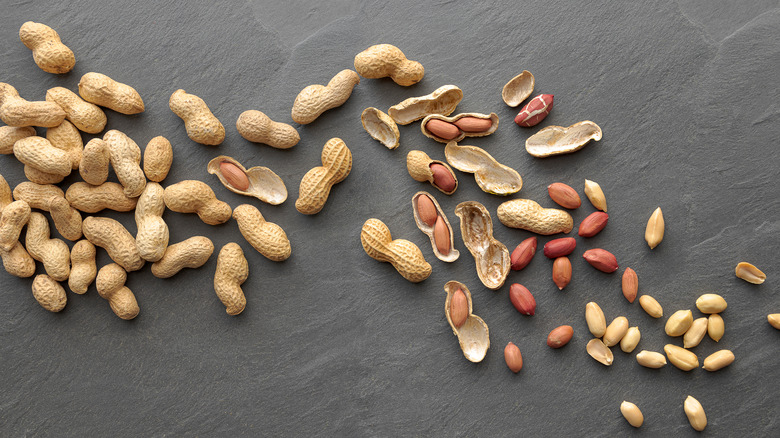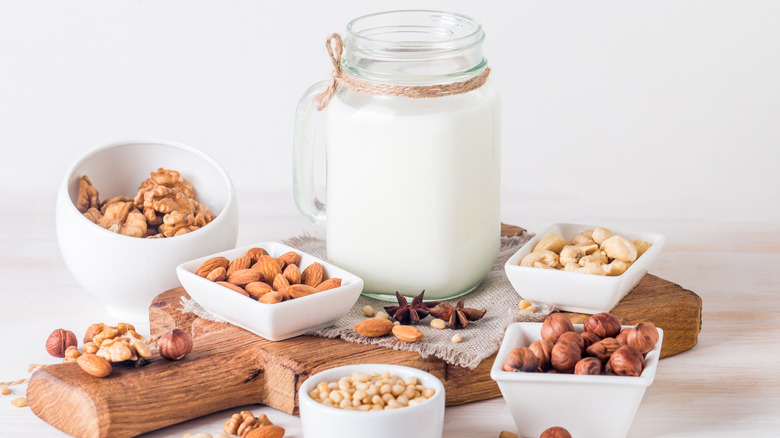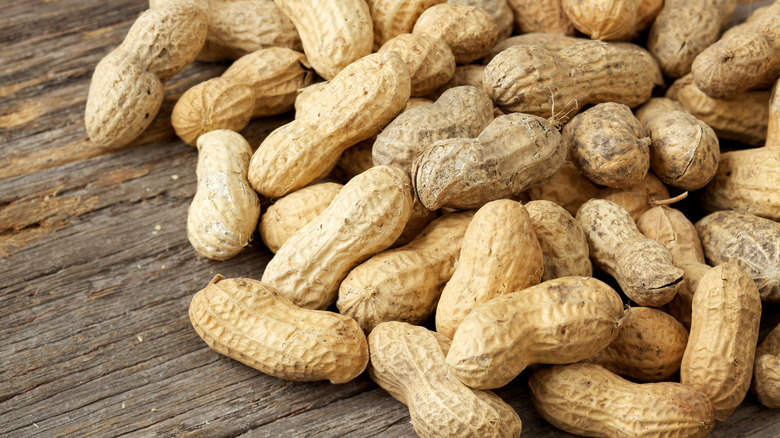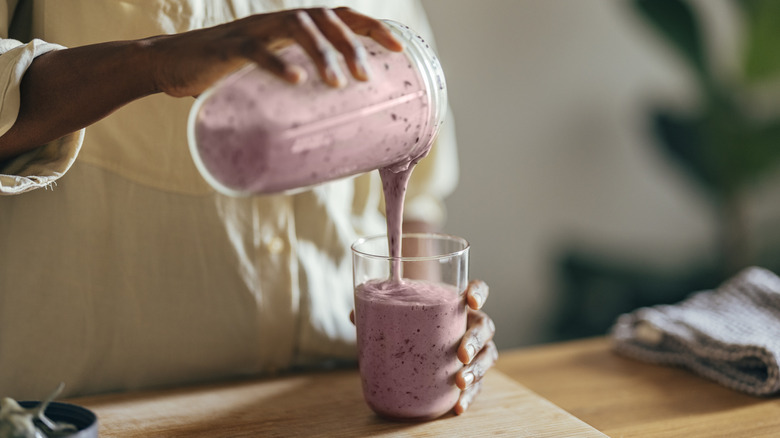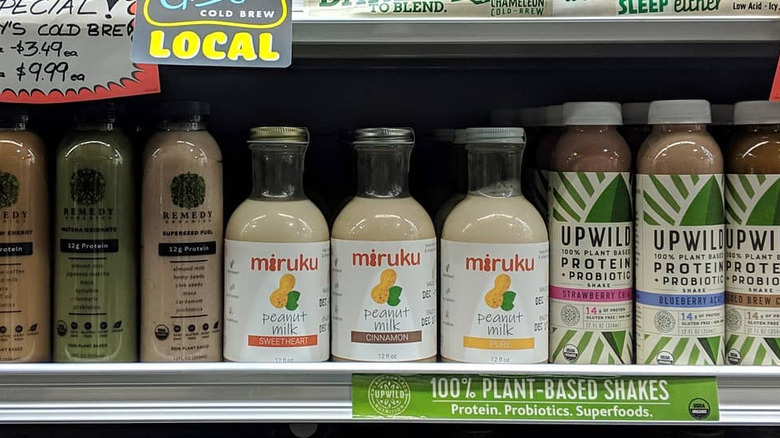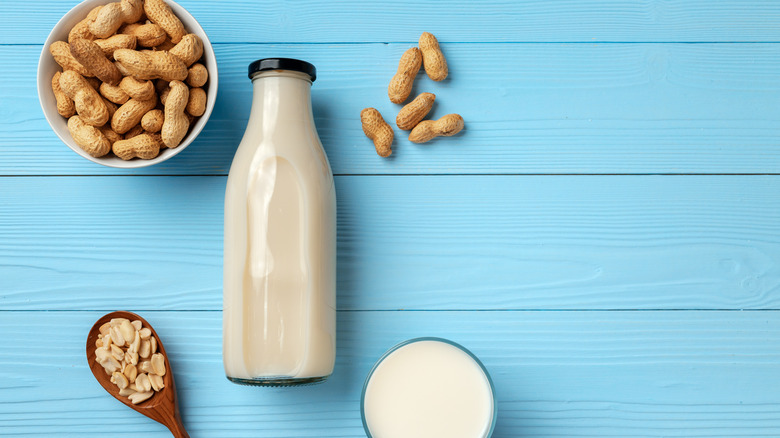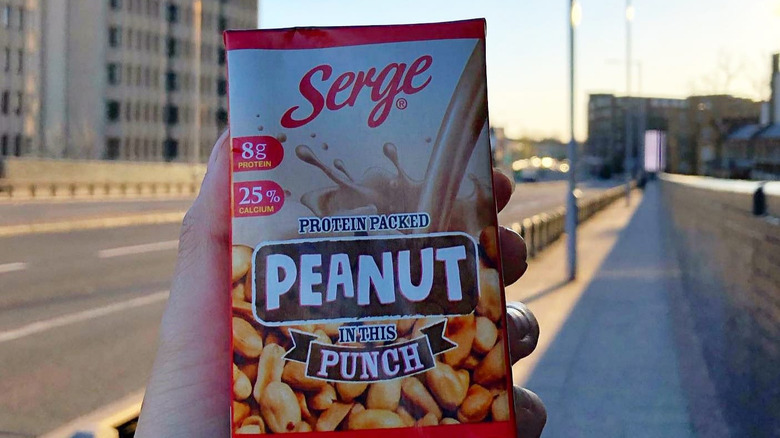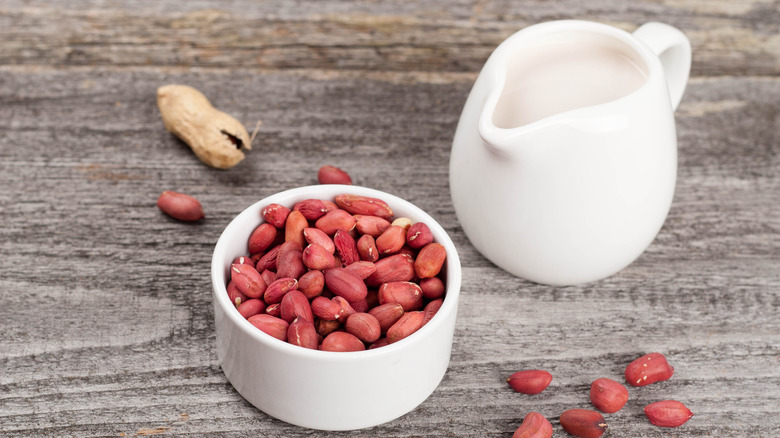What Is Peanut Milk And How Does It Compare To Other Nut Milks?
We may receive a commission on purchases made from links.
Plant-based milks have become very popular over the years, whether for dietary reasons or taste preferences. They are also easy to find in grocery stores or at Starbucks, making non-dairy milk a go-to choice. Adding these milks to a coffee beverage or a bowl of cereal creates a perfect combination. Different types of non-dairy milk continue to appear for everyone to try — and that may include peanut milk, even if you haven't had a chance to try it yet.
While peanut milk isn't new, it is lesser known and harder to source ready-made than other non-dairy milk options on the market today. Peanut milk can be very difficult to locate in stores or online, and tends to be pretty expensive if you are lucky enough to find it. The good news? Peanut milk is easy to make, offering another choice for those looking to mix up their milk selection. In this article you'll learn more about peanut milk, how to make it, where to find it, and how it stacks up against other plant-based milks.
What is peanut milk?
Peanut milk is dairy-free, and can consist of only a couple ingredients — peanuts and water. This milk can be made as a liquid or as a powdered beverage base. It's naturally vegan, kosher, and cholesterol-free. Technically a type of legume belonging to the pea family, peanuts also have a high level of protein, making peanut milk an excellent choice for those looking to add more protein to their diet.
While this drink may not be well known, it's been around for a long time. It was among the inventions developed by George Washington Carver, also known as The Peanut Man. As a pioneering agricultural scientist, Carver created some 300 products from peanuts, including paper, cooking oils, cosmetics, and yes, peanut milk. With very few ingredients, Carver devised a peanut milk recipe that tasted comparable to cow's milk while costing much less to produce. Carver's innovations led to his addressing the U.S. House of Representatives in 1921 on behalf of the peanut industry, sharing his findings on just how useful the peanut is.
Carver's insights are still having an impact today. All these years later, the word about peanut milk is spreading. According to a research report published by The Brainy Insights, the global market for peanut milk could reach over $524 million by 2030.
How is peanut milk made?
Peanut milk only takes a few steps to make. The process requires minimal kitchen items, and only water and peanuts as ingredients, but it can be customized to make the milk sweeter if preferred.
Start by soaking 1 cup of raw or roasted shelled peanuts in 4 cups of water for at least six hours, but ideally overnight. Then drain the peanuts and rinse them with cold water. Next, add these peanuts and no more than 3 cups of fresh water into a food processor or blender to mix up the milk. After a minute or so, the drink should appear blended and smooth.
Now it's time to strain the milk. This ensures that your liquid is smooth and does not include any tiny pieces of peanuts, like the pulp found in orange juice. To do this, it's recommended to use a cheesecloth or a specialized nut milk bag (available on Amazon), as peanut particles can be quite small. And that's it! Really, no joke. You can be a peanut milk creator in mere minutes after the peanuts have been soaked in water.
Peanut milk should be stored in the fridge, where it can remain drinkable for four days. Oh, and a tip: Don't throw away the strained-out peanut fragments, as those can be made into peanut flour, which can be included as an ingredient in baked goods or incorporated into homemade peanut butter. Peanuts — the gift that keeps on giving.
Peanut milk vs. different nut milks
Each type of non-dairy milk has its own taste and texture, and peanut milk is no different. I decided to make this milk myself to understand just how much it varies from other plant-milk options available. While peanut milk can be made with just peanuts and water, it has a creamier texture than some nut milks, especially if you add ingredients such as dates.
Compared with almond milk, peanut milk brings more creaminess. Looking at the ingredients, peanut milk is also higher in protein and fat than almond milk. Pistachio milk has more iron and a less nutty taste than peanut milk, but peanut milk offers more vitamin E than its pistachio-based counterpart. With a silky consistency, cashew milk has considerably less calories than peanut milk, but peanuts contain more heart-boosting beneficial fats.
Meanwhile, coconut milk has more saturated fat than peanut milk, though the two are fairly similar in texture. When you drink coconut milk, it tastes like coconuts, just a bit more mildly so. Peanut milk has that same quality. After taking a sip of peanut milk, there is no doubt about what ingredient went into creating it. Each milk brings its own strengths. As plant-based milks become more common and popular over the years, the options expand. Try different kinds to determine your favorites.
What does peanut milk taste like?
If you like the taste of peanuts, creamy peanut milk is for you. However, if you aren't sneaking a spoonful of peanut butter or a chocolate peanut butter cup repeatedly throughout the week, it's possible that peanut milk may not be your favorite.
When making peanut milk, it's recommended to use unsalted peanuts to keep the resulting beverage from being too salty. If this drink is made with just water and peanuts, the taste of peanuts is very strong. This can be perfect to add as creamer in a cup of coffee, but anyone looking to drink peanut milk directly may want to think about throwing in extra flavorings. To increase the sweetness, try adding honey. When first making my own batch of peanut milk, I added dates and vanilla, creating an even creamier texture that helped the drink stand on its own.
However, even with a sweetening ingredient, the taste of peanuts is dominant. It can taste like you are drinking the milk from a bowl of Reese's Puffs cereal. For some, that may be a dream. If that sounds more like a nightmare (or, of course, if you're allergic to peanuts), it's best to stay away from this milk.
How to cook with peanut milk
Peanut milk can be enjoyed on its own, or paired with a dessert or cereal (hello again, Reese's Puffs). For those who love to dunk an Oreo cookie in a glass of milk, try doing that with peanut milk instead. Not only is this delicious, but it's also an ode to "The Parent Trap" scene demonstrating that Oreo cookies and peanut butter go hand-in-hand.
Another suggestion is to add chocolate syrup to peanut milk for next-level chocolate milk. Peanut milk can also be a great base in smoothies — add in bananas, blueberries, and some spinach for a protein-filled glass after a workout. With my own batch of homemade peanut milk, I added a bit of it to my coffee in the morning, which gave my brew a great flavor.
Peanut milk is perfect for vegans seeking non-dairy substitutes for meals, both savory and sweet. Try substituting peanut milk for dairy in your go-to soup recipes that call for milk, or using peanut milk as a base liquid in a stir-fry. Also, think of the great effect that peanut milk can have in baked goods. Substituting almond milk with peanut milk in a banana bread overnight oats recipe? Goal. Using peanut milk in a dairy-free French toast recipe? Incredible. We'll stop with the suggestions, but not because we want to.
Where to buy peanut milk
Peanut milk is difficult to find at stores. When searching for it in Los Angeles, I checked multiple grocery stores, from Whole Foods to Ralphs to Target, and wasn't able to find it at any of those locations. Searching online did not provide much luck either. Elmhurst previously sold a variety of peanut milk, but production of that ended only a couple years after its debut.
It's important to mention that peanut milk is easier to find in other countries. In Nigeria, peanut-based milk (called groundnut milk) is a common homemade drink served chilled. Vietnam's Rita Beverage Company offers peanut milk in 200-milliliter boxes. The world's two most populous nations, India and China, also produce mass-marketed versions of peanut milk. As more plant-based alternatives are desired by consumers, it may only be a matter of time before the popularity of peanut milk increases in the United States.
If you haven't previously heard of peanut milk, be sure to keep an eye out for it at grocery stores. Until that glorious moment when peanut milk appears at your local store during a Sunday shopping trip, the best way to taste it would be to make it yourself. Fortunately, the ingredients commonly used to make peanut milk can be found easily in stores and online.
Nutritional information about peanut milk
Compared among all nuts, peanuts contain the highest amount of protein per serving. Naturally, this high protein content is also found in peanut milk, which has many other nutritional benefits.
Peanut milk is rich in unsaturated fats, which are helpful for keeping cholesterol levels in check. Peanuts also feature vitamin E — an antioxidant that is important for healthy blood, vision, and skin — and vitamin B-6, which boosts the immune system. The magnesium content of peanut milk helps increase energy levels while assisting with lowering blood pressure. If all that's not enough, drinking peanut milk also increases your fiber intake.
While it does provide a number of health benefits, don't go drinking all the peanut milk. Even though its unsaturated fats can be helpful, drink this milk in moderation, because one cup can have well over 200 calories. Furthermore, peanuts have high levels of oxalate, which is linked to the development of kidney stones. Several varieties of other plant-based milk — including almond, cashew, and soy — also feature notable amounts of oxalate.
Varieties of peanut milk
Similarly to other plant-based milks, there are different types of peanut milk to try, and some intriguing derivatives. In the Caribbean, popular Serge Peanut Punch blends liquefied peanut butter with milk powder and sugar. This tropical treat is unique, but it contains a dairy product, along with additives like disodium phosphate.
Other countries produce peanut milk powder, which is not unlike peanut butter powder. This option has a longer shelf life, making it convenient to keep in the pantry (if you can find someplace to purchase it in the first place). As a bonus, peanut milk powder is made from defatted peanuts. The result? The peanut powder has some of its fat removed while remaining high in protein, making this a perfect add-in for a post-workout smoothie.
As mentioned before, peanut milk is more popular outside of the United States. Because of this, there are some great types to try internationally, from China's YL Peanut Milk Drink — which comes in a can ready for drinking — to the organic KoRo peanut drink available in the European Union, which is suitable for drinking straight or using for baking and cooking. Which will you try first?
How to store peanut milk
After making peanut milk, it will need to be stored in the refrigerator. This milk can be kept in any container for liquids. When I made it, I used Mason jars to ensure the milk was sealed. This milk typically lasts in the fridge for about four days. If you anticipate not using much of the milk within that time, it's best to make a smaller batch so that none will be wasted.
However, most ingredients required to make peanut milk have a long shelf life — like peanuts, vanilla, dates, and honey — so it's easy to keep everything on hand and store them for a long time. Craving some peanut chocolate milk? Take the quick steps to soak the peanuts in the morning, and that evening you can whip up some peanut milk to mix with chocolate syrup, and enjoy a delicious dessert beverage after dinner.
Also keep in mind that peanut milk powder can be stored for a much longer time period than freshly made peanut milk — around a year and a half — so if you can find it, this is a great option to have when you're in a hurry.
